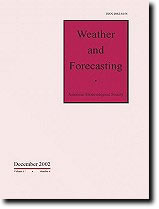 | |
| Discipline | Meteorology |
|---|---|
| Language | English |
| Edited by | Gary Lackmann |
| Publication details | |
| History | 1986–present |
| Publisher | American Meteorological Society (United States) |
| Frequency | Bimonthly |
| Delayed, 1 year | |
| 3.025 (2020) | |
| Standard abbreviations | |
| ISO 4 | Weather Forecast. |
| Indexing | |
| ISSN | 0882-8156 (print) 1520-0434 (web) |
| Links | |
Weather and Forecasting is a scientific journal published by the American Meteorological Society. It includes articles on forecasting and analysis techniques, forecast verification studies, and case studies useful to forecasters. Common topics include reports on changes to the suite of operational numerical models and statistical post-processing techniques and articles that demonstrate the transfer of research results to the forecasting community.